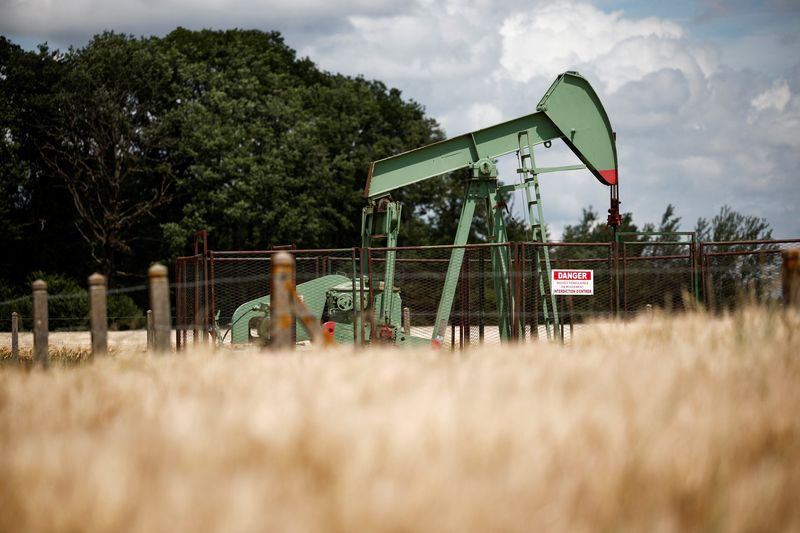By Arathy Somasekhar
HOUSTON (Reuters) - The volume of global crude exports in 2024 declined 2%, the first fall since the COVID-19 pandemic, shipping data showed, due to weak demand growth and as refinery and pipeline changes reshuffled trade routes.
Global crude flows have been roiled for a second year by war in Ukraine and the Middle East, with tanker shipments rerouted and suppliers and buyers split into regions. Middle East oil exports to Europe declined and more U.S. oil and South American oil went to Europe. Russian oil that formerly went to Europe has been redirected to India and China.
These shifts have become more pronounced as oil refineries have shut in Europe amid continued attacks on Red Sea shipping. Middle Eastern crude exports to Europe tumbled 22% in 2024, ship tracking data from researcher Kpler showed.
The shift in oil flows "is creating opportunistic alliances," said Adi Imsirovic, an energy consultant and former oil trader, citing closer relationships between Russia and India, China and Iran that are reshaping oil trade.
"Oil is no longer flowing along the least cost curve, and the first consequence is tight shipping, which raises freight prices and eventually cuts into refining margins," said Imsirovic.
The U.S. with its surging shale production has been a winner in the global oil trade. The country exports 4 million barrels per day, boosting its share of global oil trade to 9.5%, behind Saudi Arabia and Russia.
Trade routes have also been reshuffled by startup of the massive Dangote oil refinery in Nigeria, expansion of Canada's Trans Mountain pipeline to the country's west coast, falling oil output in Mexico, a brief halt in Libyan oil exports, and rising Guyana volumes.
In 2025, suppliers will keep grappling with falling fuel demand in major consuming centers such as China. Also, more countries will use less oil and more gas, while renewable energy will keep growing.
"This kind of uncertainty and volatility is the new normal - 2019 was the last 'normal' year," said Erik Broekhuizen, a marine research and consulting manager at ship brokering firm Poten & Partners.
FURTHER ROOM TO FALL
Changes in oil demand forecasts have pulled the rug out from historical long-term oil market growth assumptions, Broekhuizen said.
"In the past, you could always say that there will be healthy long-term demand growth, and that solves a lot of problems over time. That can't really be taken for granted anymore," he said, citing weaker demand in China and Europe.
China's imports fell about 3% last year with gains in electric and plug-in hybrid cars, and growing use of liquefied natural gas in its heavy trucking. In Europe, lower refining capacity and government mandates to reduce carbon have shaved crude imports by about 1%.
NEW SUPPLIERS, NEW ROUTES
Europe's refiners initially cut Russian imports and increased both U.S. and Middle Eastern oil purchases after Russia invaded Ukraine. Attacks on ships in the Red Sea following Israel's war on Gaza pushed up the cost of shipping from the Middle East. Refiners stepped up imports from the U.S. and Guyana to record highs.
Exports from Iraq declined 82,000 bpd and United Arab Emirates exports fell 35,000 bpd in 2024. Europe added 162,000 bpd from Guyana and 60,000 bpd from the U.S.
Escalating Middle East conflict around late September and fears of more sanctions from U.S. President-elect Donald Trump led to tighter supply and higher prices of Iranian oil. This prompted Chinese refiners to look at oil from West Africa and Brazil.
NEW REFINERIES, PIPELINES
Nigeria's new Dangote refinery consumed enough domestic supply to keep around 13% of Nigeria's crude exports in the country in 2024, up from 2% in 2023, according to Kpler. That cut Nigeria's exports to Europe, and Nigeria also imported 47,000 bpd of U.S. WTI, unusual for a major net exporter.
New refining capacity ramping up in Bahrain, Oman and Iraq as well as Dos Bocas in Mexico are also likely to soak up oil production in those regions.
In Canada, the expanded Trans Mountain pipeline can now ship an extra 590,000 bpd to the Pacific Coast, lifting the nation's waterborne exports to a record 550,000 bpd in 2024.
This has had a ripple effect: With increased Canadian crude flowing to the U.S. West Coast, refineries in the region bought less Saudi Arabian and Latin American crude, while direct shipments from Canada to Asian countries have cut re-exports from the U.S. Gulf Coast.

While China has been Canada's major buyer, the crude has also found importers in India, Japan, South Korea and Brunei and more Asian refiners are likely to purchase the oil, analysts noted.
Trump's proposed 25% tariff on Canadian and Mexican crude, the top two foreign oil suppliers to the U.S., could also change oil flows in 2025, analysts said.